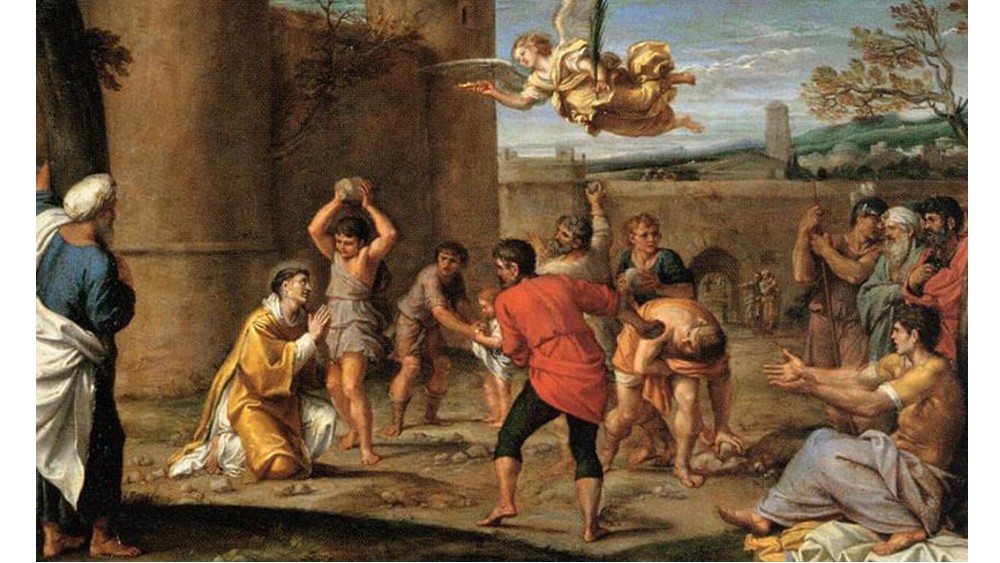On the 2nd Day of Christmas, The Feast of St. Stephen
The 2nd Day of Christmas and the Feast of St. Stephen, the first Christian to be martyred for his faith in God and Jesus Christ
The Feast of St. Stephen, The First Martyr of the Church
Stephen was one of several people whom Peter and the apostles appointed as the first Deacons of the Church. Stephen proved to be an effective proselytizer and he drew the ire of the Sanhedrin, the Jewish Rabbinical Court, before whom Stephen was falsely charged with blasphemy against Moses and God (See Acts 6 and 7). Stephen did not waiver in his faith. He declared his belief in Christ and described a vision that he had of Christ at the right hand of God. That did not convince the Sanhedrin, and in 34 A.D., they voted to execute him by stoning. St. Stephen’s execution was itself notable in that Saul (later, “Paul of Tarsus” after his conversion) took part in the stoning.
St. Stephen is the patron of stone masons, those with headaches, and horses. “The reason for this last is unknown, but this patronage is very ancient, and in rural cultures and olden times, horses are/were blessed, adorned, and taken out sleighing, and foods for horses were blessed to be fed to them in times of sickness.” The Feast of St. Stephen was historically offered in honor of all Deacons of the Church.
Boxing Day
The 2nd Day of Christmas is Boxing Day in Britain and many of the nations that were once part of the British empire.
It became customary in medieval England that the priests would empty the alms boxes in all churches on the day after Christmas and distribute the gifts to the poor of the parish.
The Oxford English Dictionary gives the earliest attestations from Britain in the 1830s, defining [Boxing Day] as “the first weekday after Christmas day, observed as a holiday on which postmen, errand boys, and servants of various kinds expect to receive a Christmas box.”
The term “Christmas box” dates back to the 17th century, and among other things meant:
A present or gratuity given at Christmas: in Great Britain, usually confined to gratuities given to those who are supposed to have a vague claim upon the donor for services rendered to him as one of the general public by whom they are employed and paid, or as a customer of their legal employer; the undefined theory being that as they have done offices for this person, for which he has not directly paid them, some direct acknowledgment is becoming at Christmas.
Two Major Events on December 26
1790 – The War on Christianity in Western Civilization
Socialism’s war on Christianity — something that has lasted through this day — began at socialism’s birth in the French Revolution. On this day, King Louis XVI of France, trying to save his monarchy, assented to the Civil Constitution of the Clergy, subordinating the Catholic Church to the revolutionary government. This was a first strike in what has proved an existential and ongoing war against the Judaeo-Christian religions. (Do read the article at the link, one of Bookwormroom’s best posts).
1991 – The Supreme Soviet of the Soviet Union meets and formally dissolves the Soviet Union.
It is not often in history that a major empire dissolves peacefully and internally on an identifiable day. But for all the blood that was shed in the 70 year formation and life of the Soviet Union, it’s ending was the peaceful opposite.
In the end, Karl Marx’s communist nirvana proved to be nothing more than an Orwellian police state sitting atop a socialist economy that could not compete economically with the West. One would have thought that the Soviet example would have been the end of communism and the entirety of Marx’s bloody fantasies. Unfortunately, as Thomas Sowell noted in 2016, Marxist theory is alive and well in the ivory towers of the West. Moreover, it underlies the global warming movement, rising in support every day that the world moves farther from -– and forgets –- the Soviet example.
Christmas Music
The carol, Good King Wenceslas, is a 19th century British carol that tells the story of the beloved 10th century Saint Wenceslaus I, Duke of Bohemia who, in harsh winter weather, went forth to give alms to a poor peasant on the Feast of Stephen (December 26, the Second Day of Christmas). The 1853, Englih lyric by John Mason Neale. is set to the melody of the 13th-century spring carol “Tempus adest floridum” (“Eastertime Is Come”) first published in the 1582 Finnish song collection Piae Cantiones.

